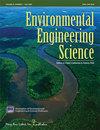Recirculating Vertical Hydroponic Systems: Effect of Light and Nutrient Solution Composition on Nitrification Activity
IF 1.8
4区 环境科学与生态学
Q4 ENGINEERING, ENVIRONMENTAL
引用次数: 0
Abstract
Nitrogen-rich effluents from anaerobic processes present nutrient resource recovery opportunities for fertilizer applications in hydroponic systems, thus facilitating agricultural production in less conventional contexts such as urbanized areas. However, the high ammonia and soluble chemical oxygen demand, which is common in anaerobic digestate, can inhibit crop development in a hydroponic system, requiring conditioning to enable optimal performance of the system. This study examines the use of three nutrient sources to support the growth of lettuce (Lactuca sativa) in vertical hydroponic systems: (i) synthetic permeate (SP) solution, (ii) desorption solution (DS) from an anaerobic membrane bioreactor (AnMBR), and (iii) DS modified with acetic acid addition. Two light conditions were used to observe the effect of photon flux (from 150–200 to 10–15 μmol/[m2·s]) on lettuce crop development and nitrification efficiency of the treated AnMBR permeate. Fresh and dry mass of the harvested lettuce crops as well as chlorophyll content were measured as an indicator of crop quality after a 13-day development period. Crops grown under well-lit conditions in DS had harvested fresh weight (2929.0 ± 454.6 mg/plant) than SP-grown crops (2646.2 ± 908.8 mg/plant). The lighting conditions did not significantly impact the nitrification efficiency; thus nitrate, the preferred form of nitrogen for supporting lettuce crop development, was sufficiently available to support crop growth in the recirculating hydroponic systems.垂直循环水培系统:光照和营养液组成对硝化活性的影响
厌氧过程产生的富氮废水为水培系统施肥提供了养分资源回收机会,从而促进了城市化地区等非常规环境下的农业生产。然而,在厌氧消化中常见的高氨和可溶性化学需氧量会抑制水培系统中作物的发育,需要调节以实现系统的最佳性能。本研究考察了在垂直水培系统中使用三种营养源来支持生菜(Lactuca sativa)的生长:(i)合成渗透液(SP)溶液,(ii)厌氧膜生物反应器(AnMBR)的解吸液(DS),以及(iii)添加乙酸改性的DS。采用两种光照条件,观察了150 ~ 200 μmol/[m2·s]和10 ~ 15 μmol/[m2·s]的光子通量对处理过的AnMBR渗透膜生菜生长发育和硝化效率的影响。在13 d的生育期后,测定收获的生菜作物的鲜质量、干质量以及叶绿素含量作为作物品质的指标。光照条件好的DS作物收获鲜重(2929.0±454.6 mg/株)高于sp作物收获鲜重(2646.2±908.8 mg/株)。光照条件对硝化效率影响不显著;因此,硝酸盐是支持生菜作物生长的首选氮形式,在循环水培系统中充分可用来支持作物生长。
本文章由计算机程序翻译,如有差异,请以英文原文为准。
求助全文
约1分钟内获得全文
求助全文
来源期刊

Environmental Engineering Science
环境科学-工程:环境
CiteScore
3.90
自引率
5.60%
发文量
67
审稿时长
4.9 months
期刊介绍:
Environmental Engineering Science explores innovative solutions to problems in air, water, and land contamination and waste disposal, with coverage of climate change, environmental risk assessment and management, green technologies, sustainability, and environmental policy. Published monthly online, the Journal features applications of environmental engineering and scientific discoveries, policy issues, environmental economics, and sustainable development.
 求助内容:
求助内容: 应助结果提醒方式:
应助结果提醒方式:


